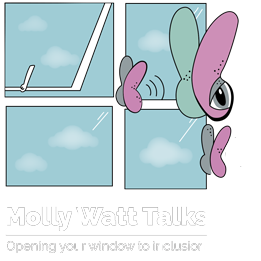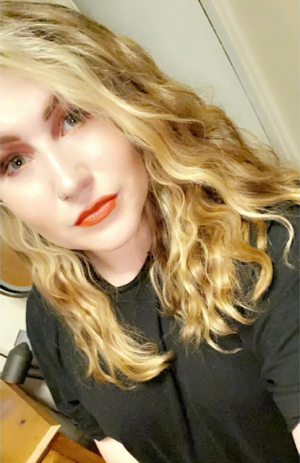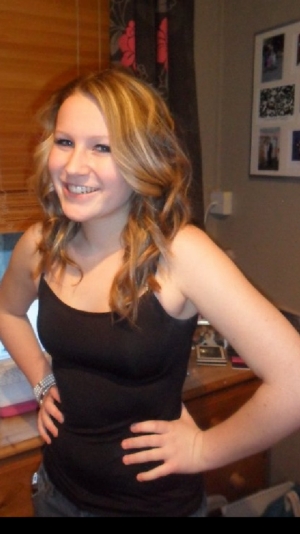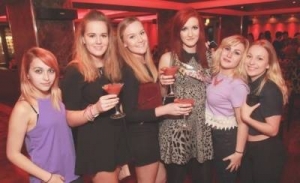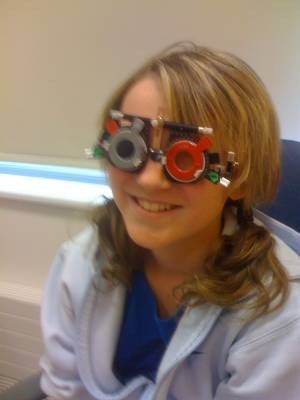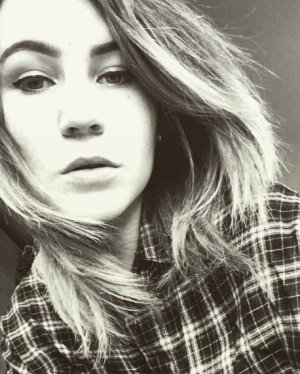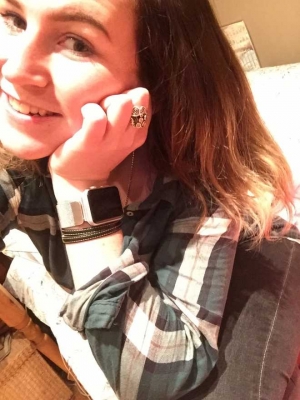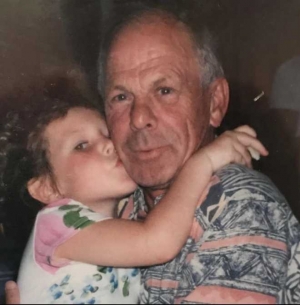My Zara Experience!
As more and more brands become only available online organisations like Zara really need to get on top of online accessibility for all.
Do people think that blind people don’t like fashion, or enjoy online clothes shopping?
Judging by the poor user experience of a lot of clothing websites - you’d think so!
Back in the day when we were allowed to go shopping in the flesh, browse the aisles, feel the fabrics and try on as many items as you’d like I like most have my few favourite brands and shops...
Zara being towards the top of my list of shops to visit. In fact I’m well known for being a Zara fanatic, a friend will say “love that, where’d you get it from,” and they’d answer their own questions “Let me guess, Zara!”
Here we are, in 2021 still living through a pandemic and as we all know the actual physical aspect of clothes shopping diminishing, however somehow we have to meet our shopping needs, wants and cravings!
Online shopping it is.. I mean, not always to spend money of course, a little browse won’t hurt... Famous last words!!
But of course, blind people don’t shop online do they!? Meeting contrast standards is unheard of, flashing content is intense and uncomfortable, and if you’re a screen reader user, you can forget it! For a blind user like myself who simply loves shopping, and although the lack of online accessibility is probably saving me a lot of money, it is costing big brands and organisations billions! Clearly accessibility is not a big consideration if a consideration at all for Zara and many others - perhaps little old me seems unimportant but losing out on ££££’s should be a huge concern.
Pandemic or not I still have my cravings, I still want and like to keep on trend and need to update my wardrobe to cheer myself up, in what is very dark times in the age of coronavirus.
I have worked with the accessibility departments of various fashion houses and I have to say the changes they have made have made a huge difference to my online shopping experiences!
For instance at ASOS, alt texts are appropriately applied, colour contrasts are better met and the ability to change to “dark mode,” to reduce any unwanted eye strain and headaches. But even ASOS doesn’t sell everything.
Where are all the other accessible experiences?
No Sight, No Sound, No Social Media!
Being born with a condition is very different to acquiring one, I have the experience of both!
I was born deaf, hearing aids from 18 months old, audiology appointments, speech therapy and a specialist teacher of the deaf for support. It was all I knew until I was 12 years old and it all worked very well.
It all changed when I was diagnosed with Usher Syndrome.
I was told I'd go blind but that it would be a gradual process, for me I went from perfect sight to registered blind in two years, I have been one of the unlucky ones.
I was born with perfect sight and being deaf meant I used my eyes to compensate for my deafness.
I relied on my eyes to lipread, to learn to speak, I could see facial and body gestures which helped me understand mood, happy, sad, angry.
Often when in loud or difficult situations where I couldn't hear with my hearing aids if I could see a face or faces I could lipread and get by.
I could literally hear with my eyes.
The "deaf language" BSL (British Sign Language) for some is all about being able to see. The deaf use their eyes the way nobody else has to.
To experience deafness from day one and then lose sight is very different to being born with sight loss.
I have had to learn to live with a second sensory loss, it doesn't just happen like it did with deafness.
The impact of blindness on an already deaf person is profound, particularly when it happens so quickly.
People seem to think all blind people use Braille, some do but for me and lots I know who have the smallest window of vision we still read text.
For me it's like holding onto the smallest amount of "normality" however, it's no longer like picking up a book, a paper, a magazine, looking at a computer screen, no, that "normality" went with my sight.
Everything now has to be modified and that doesn't mean made bigger like so many assume necessary for the blind!
I see only with one eye and when reading I see the equivalent in size as a 5 pence piece, pretty tiny so things need to be right.
Making text accessible for me really isn't that difficult. Firstly white paper / background is the absolute worse, the glare is painful.
Why so many websites are white background and narrow small text is very irritating. Buff or cream is so much easier and text size 18 or 24, in blue and arial is ideal or why not have accessibility features for those of us who need it to adjust to what suits, is that so difficult?
My preference for reading is on a Kindle, the basic one as there is no glare and it allows me to adjust text size and lineage.
I could read 3/4 pages on an iPad before suffering from the screens glare, with the Kindle I could read several chapters at a time. It was only because of the Kindle that I managed to complete my English A Level.
I like the control of accessibility my MacBook gives me, particularly for the things I need to do online, however I have to restrict my use because my eyes are very delicate.
I am not ready to make the transition to voiceover and bear in mind I'm deaf so voiceover needs to be accessible to me. I am fortunate that with my new hearing aids I am able to access sound with Bluetooth however, unfamiliar voices, accents, speed of speech, dialects, male, female can all be challenging so not quite as straight forward as some might think.
there isn't a book to teach or explain individual access needs, one size or specification doesn't necessarily meet all need but I find myself adapting things myself, which is fine if they can be adapted!
Am obvious coping strategy is a good memory, those that know me well know not to move things without telling me or it means me falling over, knocking over or losing something which can be upsetting and / or frustrating and I don't just mean things in the house, work place but everywhere, anything that moves without my knowledge becomes an issue!
It is probably a good place to now discuss Facebook.
Facebook has a habit of moving things around far too often and they cause untold frustration and often real isolation to the blind community.
Already Facebook is a cluttered page which makes navigation difficult to start with.
Facebook presents itself very differently on my various gadgets.
I will start with the worse for accessibility.
On my iPhone:
The app only allows white background with black text, the glare is unbearable and even worse it is impossible to enlarge the text - this makes the app inaccessible to me.
The icons at the bottom of the page, News Feed, Requests etc are tiny and in the faintest text.
The icons get moved around for no apparent reason making navigation unnecessarily difficult for those with visual impairment or blind.
On actual posts the text, reply or like is tiny and faint. If like is tapped the writing apparently changes colour I cannot see this!
Strangely the Messenger app does enlarge text if the iPhone setting is set to large.
I have had to get help to write about Facebook for iPhone as I'm unable to use it because of the reasons stated above.
Facebook on MacBook:
Again all white background and black text, terrible.
The three vertical columns are very hard for me to navigate with such restricted vision, as I result I have to scan and can get lost quite easily.
Column 1:
Name in bold, if I was not using my Mac which allows me to enlarge I would struggle to read. Underneath the name is small subheadings with small pictures in front of them - either events, groups or pages, next to these small numbers, I struggle to see all of these things again relying on my Mac to zoom in.
Column 2:
This is where most friend context lands, as previously mentioned again the awful white glaring boxes with the "like" option very faint text and a nightmare to see through the glare. Again the colour changes from grey to light blue, the contrast is very poor.
The font size is very small on all columns so I have to rely on my Mac's ability to zoom in which I do manually though this can cause the screen to break up making it difficult to stay I in the correct column.
Column 3:
Again same colour scheme, white, pale grey, dark blue and a light blue. The bulk of the smallest text is in pale grey underneath comments, again terrible contrast and impossible for me to access.
A little further down the page is "Your Pages" again most text in the awful pale grey colour, I don't even try to read these, simply not accessible.
"Trending" also in the awful pale grey text. A lot of the posts in this column if the sub titles are lingered over little boxes of black text appear, I can actually read this and then another box this time grey with pale grey writing, completely inaccessible.
Furthest along the page are friends profile pictures which are small with tiny dots to indicate if they are online. I have noticed if I linger with the mouse another column pops up with people's names.
I find it hard to speak to somebody via the Facebook webpage because the text is too light, easier with the Messenger app!
Requests, Messages and Notifications are small icons in the top corner of the page again there is very little contrast for me to recognise one icon to another.
Beside the Notifications is the smallest icon and a tiny arrow. This is very important as it's the privacy settings, I had to have help setting these so perhaps not as private as I'd like! Major fail for those of us with poor sight.
I find navigating my own profile considerably easier as there is only two columns, much less cluttered which is good but still small grey text.
Changing cover photo remains something I need help with, the camera icon far too small to see.
On iPad
This changed on Friday and after over an hour trying to navigate the new layout I had very painful eyes and gave up.
Facebook is widely used to bring people together, often very lonely and otherwise isolated people who find huge comfort in reaching out to others similar to themselves.
It is a fact that people in smaller communities like mine often have never met or spoken to others with the same condition which is in itself isolating.
Facebook is great for relieving these issues but sadly they are failing some of the most vulnerable with their poor accessibility.
Good accessibility would work for everybody, a choice of colours, contrasts and text sizes is that so difficult?
Let Me Be a Part
In a lot of my talks I often mention how grateful I am to have great family and friends. I could not imagine myself as a person without either, I really cannot.
As I grew up I was very close to my parents and am lucky to have been well socialised.
I have some amazing and happy memories, from days out to holidays.
I always also looked forward to being with my friends at school.
I have mentioned before I knew I was different pretty early on.
Lots of my friends were walking to/ travelling to school independently, I was walked or was put in a taxi to get to school.
I always had to leave the house with my friends to be assured of my safety or I would get my parents to drop me off exactly where I needed to be.
Not being able to hear cars from very young, and then with my eyes failing so quickly I wasn’t able to be as independent as my friends.
I didn't resent this until my sister grew up and realised just how dependent I was and had been through my younger years and right the way through my teens.
Now with Unis I have independence, I know it isn't the same as most but it's as good as it gets for me.
I work part time, spearhead my charity advocating for others and I'm currently building up my own business as a Motivational Speaker - I work very hard and it's exhausting but I am very determined.
I am a very sociable person - believe it or not being sociable is really hard work for me but I'm no different to lots of 20 year olds in this respect, I want to be a part of what is going on. Be it with family or friends I love eating out, sitting in a pub chatting, clubbing, or partying - I like a good laugh but doing these things can be quite a challenge but on the whole those close to me know how to make life easier without making me feel a burden, thankfully as that has to be the worse feeling ever.
Last week, for the first time in a long, long time I got forgotten, I cannot tell you how upset I felt and nobody was really to blame - it was a real "Usher Syndrome" moment "isolation" I was very hurt and a painful reminder of what this hidden condition can do to those of us burdened with it.
An arrangement was made for drinks two train stops away with a group of colleagues and friends, the arrangement had been made with an online chat application which isn't great for me if its a long conversation with lots of people taking part it is virtually impossible for me to keep up as I have the font so large it would take me forever to keep a track of the conversation - I missed all the details and along with it the night out.
I was very hurt and to add to the hurt were the pictures posted online of everybody having fun whilst I was sat at home.
I know this situation wasn't manufactured on purpose but it happened all the same and I would like those around me to consider how they would feel if it happened to them.
I only ask that there could perhaps be a conversation on a one to one with me so that I know what it happening and I can then plan so that I can be included.
I have socialised as part of this group a few times and I don't think it was too big a deal for anybody else but it made a huge difference to me - I was dropped at the station where I was met by a friend and we travelled together, previously I was collected from home and we travelled by car, of course I'm always happy to offer travel expenses - I just want to be a part of things.
Guidedog owners are not permitted to work their dogs under the influence of alcohol so I am unable to be completely independent if going clubbing or partying which is absolutely understandable.
I work tirelessly to make people aware of the many daily challenges people like myself endure and I guess I'm fortunate these instances don't happen very often but when they do it is a constant reminder of the isolation Usher Syndrome can cause.
I never want to feel or be a burden to anybody but the reality is I do need assistance sometimes, we all do from time to time.
So for those who think mobility isn't an issue to those with Usher Syndrome think again, not only is it an issue it can cause real isolation...
Just Imagine
Having Usher Syndrome means deafness with a progressive blindness and for some complete blindness.
None of us can possibly know if we will be unlucky enough to lose all sight, however it is a consideration.
I lost so much sight so quickly the thought of any further progression has been scary and something I choose not to think about it unless I have to.
At the beginning of the year I found myself in that position, through no fault of my own, where was I going with my life.
The profession I'd originally dreamt of was gone and now at 20 years old I needed to reconsider what I could do being deaf and already very blind.
Most would assume "Deafblind" what can she do? Well, you'd be surprised at the things I can do!
I doubted myself a lot after diagnosis, always questioning the whys and how's.
The one thing that never changed was my parents determination to nurture and fight for me every step of the way even though they had to learn as we went.
We all need a chance to achieve what we can but how does that work when you are not given the tools to access what everybody else does?
I suffered a huge amount of discrimination through ignorance and it caused me so much distress and naturally I was "being silly or over dramatic", after all I was only going blind through my teens - "no big deal" accept it was a huge deal and terrifying - just imagine.
However, since I was 15 I have spoken publicly, initially to educate those around me of my support needs and over the past 5 years spoken in some amazing places about all sorts of things.
Life with Usher Syndrome is ever evolving, constant changes but luckily for me so too is technology.
There is always something to learn for me as much as everybody else, I just see things differently to others and how to adapt them because I have to and because I can and do.
I try to share positive and negative experiences and I'm delighted to see there is interest in my blogs and in Usher Syndrome and it's challenges from all around the world.
Also he world of technology who in many cases can hold the key to not just those with my condition accessing the world but for lots with disabilities and also the ageing population who can become isolated.
I know what it's like to feel different, to be bullied, to feel isolated, to have anxiety and depression, I know about denial, acceptance and counselling, I've experienced them all just because I have a condition that few understand, but, I understand and I use my bad experiences to advocate for others.
My path is definitely different, it's been made different through lack of accessibility, something else I'm passionate about.
I cannot highlight enough the difference technology makes to my life.
I'd just like those who need it most to be able to access it, it makes complete sense in every sense of the word.
Imagine being able to read, to write, to walk around safely, to join in, be an active part of society and then slowly these things are taken away as sight loss progresses but that you know of technology to enable you to continue with these things but you simply can't afford it - imagine that!
The future will be bright if the future is Accessible!
I didn't like to think too far ahead, however I was determined to make something of my life.
Thanks to amazing support at Primary School and later at College I made it through my A levels and to University.
Sadly University turned out to be very similar to senior school - something of a non event, big promises of support but failure to follow through.
Again let down by a system that failed in their duty of care, failed to provide accessibility or inclusion and enough really is enough.
Enough fighting, of feeling anxious, misunderstood, unimportant time to move on and do something different.
I spent two months soul searching could I physically and mentally deal with another two and a half years of fighting for support, fighting to be given access to a course I had for the first three months been denied.
This time my GP was to have a major part in my decision, he had seen what appalling treatment at senior school had done to me and he did not feel I should have to deal with anymore anxiety brought on by a society that should know better.
I felt better for that decision and also I felt relief that I had an option, something I enjoy, something I have been doing for years.
The irony that many years before I became a Keynote Speaker because of Usher Syndrome, the continuous ignorance, lack of understanding surrounding the condition meant rarely did I get the support I should have and it seemed the same for everybody living with this type of deafblindness.
Time to move on and find my individual niche.
This past year I have spent my time working part time in retail, blogging, speaking and consulting about accessibility.
I no longer have to rely on a system that simply doesn't understand the challenges of people like myself.
The general inability to understand, yes I do look ‘normal’ and I am fairly ordinary accept I have very specific accessibility needs. I am deaf but I speak, I make good use of hearing aid technology and I’m also registered blind making me deafblind.
I am tired of the constant fight for support, I have no idea how my parents battled for me for so many years, it is wearing and it really is time things were easier for the coming generations of people living with hidden disabilities like Usher Syndrome.
I set about making my mark in 2015.
My first children’s book, Frog, Froggy and Froggy was published in December 2014. A simple story about the importance of inclusion and anti bullying
Starting at the end of January with a fantastic keynote presentation to a group of Company Directors in Hinckley Leicestershire which led to a second presentation for a sister company in March.
I visited several local schools talking about my book and spending time with children with SEN which was very fulfilling for them and for me. I am very keen that young children realise that being different is both okay and acceptable a message I am portraying in both my first and second children’s books.
February 2015 I am was invited to two schools in Devon and to meet with a family in Dorset to talk about all sorts of things including living with deafblindness and my aspirations going forward.
I particularly enjoyed spending time with a very special little girl in Exeter who was special in lots of ways and she took a little of my heart with her. I was lucky to meet with her loving and supportive parents and to take assembly in her school, a mainstream school who were doing a great job, long may it continue.
In March I spoke in Bath to another amazing group of Company Directors. This presentation was one of my favourites as it was a joint one with my Mum, who is known to talk a lot but is not a keen speaker in public, she was awesome and so too was the audience.
I met some amazingly influential people that day, many of who have been very supportive of me.
By April I was beginning to really enjoy myself.
A few more local school presentations and something that was to change my life.
The day Applewatch came I out I was presenting to an awesome Company in East London.
My presentation here was fun, a young group of really inspiring people all very interested in my take on accessibility and assistive technology, two of my passions.
At the end of April 2015 I put together my Applewatch Blog
The reaction to my bog blew me away. It had been intended for the Usher Syndrome community as I set out details of it’s accessibility.
The world was interested and whilst I’m sure the big interest was because it was ‘Apple’s Watch’ over a quarter of a million people read that blog and the words ‘Usher Syndrome” and “accessibility” were referred to so lots of awareness from one blog.
At the beginning of May I worked with the BBC's See Hear Team and was filmed for a piece abour Usher Syndrome and the deaf and shown in the Uk to mark Deafblind Awareness Week in June.
Mid May I was wearing my Sense Ambassador Hat, a job I take very seriously and spoke about Usher Syndrome Awareness at The Badminton Horse Trials.
May was also the month I met with ReSound and was fitted with my Linx2 hearing aids which have enabled me to access sound in a very new way.
June saw me at the London Offices of JustGiving where I gave a short presentation to a young team and where I got to speak about website accessibility. Fantastic that so many companies are interested in fully accessible websites.
I was invited to another school, this time in Manchester. It was one of my proudest moments as I was introduced as an “Author and Illustrator”.
Although I am, I had never really considered myself that way and it felt good.
Feeling good I did my first challenge for my charity The Molly Watt Trust in June as it was ‘Deafblind Awareness Week’. I had by now decided what I wanted the Charity to fundraise for.
I was invited to do a presentation on accessibility at Facebook's London Offices in July, however I was fully booked with school presentations and speaking to local businesses, each time raising awareness of hidden disability, the importance of inclusion and accessibility for all.
In August I reached 21 years old and realised I have so much work to do and I want to get on and make a difference if I can.
I was invited to speak in Boston US in September on what was to be the first ever Usher Syndrome Awareness Day.
I set up a twitter awareness campaign #ushlookslikethis which I was delighted to see did trend for a while.
I spoke to the Boston Accessibility Group about Usher Syndrome, about my Applewatch blog and about general accessibility. There I met some very inspiring characters.
By October I had been invited to be a part of a ReSound Roadshow, six separate presentations throughout the UK and Dublin. I was able to speak in front of audiologists and hearing aid dispensers about Usher Syndrome awareness and accessibility - this invitation was a fantastic opportunity for me to be in front of an audience who can make a difference to people like myself.
I was invited to speak at https://www.manchesterdigital.com/events/camp-digital-2016 something I'm very much looking forward to.
At the end of October I had finally, with a little help, worked out how to set up a project with GlobalGiving https://www.globalgiving.org/projects/deafblind-need-access-to-life-enhancing-technology/ something I believe passionately about ‘Enabling Others’.
The ReSound Roadshow continued into November and kept me very busy, it was enjoyable and very informative and I hope to work alongside ReSound again.
After the roadshow I was invited to a school in Kent where I took an assembly and then spent time with some SEN children, a fantastic day.
November came my invite to be a Keynote Speaker in Perth Australia http://www.deafblind2016.com.au/key-note-speakers.
My last presentation of 2015 was a special day at a Bradford School where I took assembly, speaking about inclusion, anti bullying, accessibility and technology. Then spending time with the children proudly opened the New School Library
Most of the schools I visited last year have gone on to raise money for The Molly Watt Trust and to sell my books, proceeds from the books go to MWT.
All monies that go to The Molly Watt Trust go to Usher Projects as detailed at www.molly-watt-trust.org
Did I make the right decision in leaving University?
The obstacles that stacked up against me at University are gone.
Without a doubt, I no longer have to feel anxious about support for everything I do, I have independence.
My diary for 2016 is growing and my determination to make a difference is too.
I am passionate about inclusivity, inclusive technology and accessibility for all.
I am available for Keynote Speaking for more details
My Applewatch Experience 8 Months On
I thought it fitting that my first blog of 2016 should be an update on "My Applewatch Experience" after 8 months and to mention the project set up to fund it for others.
I’ve read lots of posts about applewatch, some very technical, some good and some bad.
For me it has been more personal, more about accessibility and inclusivity and how it has changed my life, enhanced it in ways I didn't believe to be possible.
Who would have thought a watch could bring independence, aid mobilty, reduce isolation and along with it confidence.
In my first blog http://www.mollywatt.com/blog/entry/my-apple-watch-after-5-days I talked about maps and safe navigation using taptics, my world has opened hugely and I have used this feature a great deal not just around the UK but also in Boston and Miami. It is very accurate and very impressive.
I’ve now found applewatch apps for public transport which have taken a lot of stress out of getting around independently. I can now access information via the watch like train platform numbers and departure times, this is something I could not do before, unable to access moving information boards or hear muffled tannoy in noisy crowded stations, I can also flag a taxi without any hassle using my watch.
Stress free navigation has been huge for me.
Applewatch is simply part of my everyday life, its features have eased my daily challenges. I have invested in a couple of new straps which allow a little variation on the look. I personally love the look, shape and size of my Applewatch, I think it’s chunky look is quite trendy.
Usage wise and from a health and wellbeing point of view I am no longer using my iPhone as much as I did which has reduced eye strain and migraine, I’m able to rely more on what my watch offers.
I enjoy the Activity feature, I walk a lot with guide dog Unis and find a satisfaction in knowing I have achieved certain goals.
My life in general is also less stressed than it was.
Usher Syndrome is deafblind however deafblind is only part of this disability, mobility is a major issue and cause of much stress when you cannot see or hear properly and this has been well addressed on applewatch as detailed above.
I have found voice to text very useful and fairly accurate, I would however like any text or message sent to state ‘sent via applewatch' just so the recipient is aware should the text be slightly out rather than possibly assume my English questionable!
Alerts via taptics is brilliant and over the months I have realised that text messages, whatsapp, tap, sketch and phone calls all have customised vibrations which means I only look at the watch if I feel I want to, again resting my eyes more than I’d previously been able to.
I still use taps as a quick and easy way of getting attention if I need to, very clever and easy on the eye too.
I use the Starbucks app regularly and also love Applepay as it means not only do I not need to carry cash but I don't feel the vulnerability and stress I used to at opening my purse and struggling with money and change. Being able to access my bank details on my watch is also so useful as cashpoints for the deafblind are very challenging, pretty inaccessible and something I would dread.
I personally don't use my Applewatch for accessing email preferring a bigger screen for anything long, however I have recently found the App Spark which I think would work for me if the text was bigger.
Applewatch is hugely convenient for anybody, even more so for somebody deafblind like myself for whom it becomes a reliable friend.
In my first Applewatch blog I wasn't using Voiceover just because of personal preference however, I have started using it on my other iOS devices and have found some speech preferences.
For those not aware Voiceover is a built in accessibility feature in Apple products which is a navigation service that reads aloud EVERYTHING you scan with your fingertip.
I feel there is room for improvement on Applewatch, it doesn't work in the same way as on other devices because of its much smaller screen.
on iPad and iPhone one finger is used to scan and listening to what is being said is fairly easy for somebody blind, for me, thanks to my Linx2 hearing aids I too can hear if I’m in a quiet environment, however, scrolling down a whole screen using Voiceover you have to use three fingers, this does not work on Applewatch.
The small screen of the Applewatch works well for somebody with very limited vision like myself and able to access text, however if reliant on voiceover I’m personally not too keen.
On the home screen the icons are very small, I struggle to see them, if you scan with your finger Voiceover will read them to you which is very useful however, moving the screen to see hidden icons whilst on Voiceover, is a real challenge, in fact, I still haven't sussed this out!
I personally would recommend setting up glances if available on your iPhone as it is much more easily accessed this way and then mirrored on the watch by swiping rather than straining your eyes to see tiny icons.
I set up as much as I could on my iPhone and it has definitely made using applewatch very easy.
There are lots of apps on my iPhone that would be very useful to be on Glances, I’m hopeful more and more will become available.
Looking back to before applewatch I used my iPhone all the time, I worried it would be snatched from me as I couldn't see or hear things around me particularly outside, I worried about battery life, would rarely venture out of my comfort zone, I really felt very vulnerable.
I had to hold the phone or have it very close to me to feel a vibration indicating a text or call and even then often missed them.
I am now easily contactable, I am well connected because of state of the art accessible assistive technology.
It has made me feel independent and confident and such a long way from the isolation I once felt and sadly so many others with Usher Syndrome still feel.
Technology does change lives and it will only improve, it needs to be available to all.
I feel so passionate about this technology that my charity The Molly Watt Trust has set up it’s first GlobalGiving project to fund applewatch for others living with Usher Syndrome https://www.globalgiving.org/projects/deafblind-need-access-to-life-enhancing-technology/
Generation Accessibility - Grandad and Me
One thing most (god willing) will not avoid is growing old!
It doesn't seem to matter how fit we are ageing brings new challenges.
I have always had the best relationship with my Grandparents and since losing my Nannie 10 years ago I have grown particularly close to my Grandad and spend as much time with him as I can. Grandad can be quite a grump but I love his wisdom and his belief in me.
The funny thing is although there are 55 years between us we have lots in common when it comes to how we get by on a daily basis.
Grandad is not registered deafblind but he relies on assistive technologies similar to what I do and he doesn't even realise it!
Grandad has worn reading glasses most of his life and they have gotten more and more magnified as he has got older.
Grandad desperately needs hearing aids, he has his television so loud, he regularly mishears or doesn't hear at all! Grandad is in denial about his hearing and sees his glasses as ‘just glasses’ and not assistive technology - Grandad is in denial but then again, Grandad is 77 years old.
I have Usher Syndrome, I am deafblind, my disability is not dissimilar to the ageing process. I certainly have much worse vision than my Grandfather and I wear hearing aids for my deafness and as a result I hear better than he does, but then again I am no longer in denial, I was for some time but not anymore, I soon learnt denial was only a comfortable place for a short time and not somewhere I could hide for too long.
I have been out to a restaurant with my Grandad, he has had to guide me safely to my seat, make sure I am sitting in an area with appropriate lighting and away from any direct bright light and then he has realised he has forgotten his reading glasses, disaster you may think but in actual fact I was able to read the menu to him. You see I am registered blind, however I have a tiny 5 degrees of sight in my right eye which could be compared to looking through a straw and for that I do not need glasses. I do have good and bad days with it but on a bad day and I was struggling, as menu's can be hellish to read, I would take a picture with my iphone and then zoom in, glasses do nothing for me, but technology wins the day always.
This interesting comparison gets better as 3 Christmas’s ago we bought Grandad an iPad for Christmas, something he had insisted he was not interested in for many years. He simply did not understand the capability of an iPad and I'm pretty sure his own silly pride that he thought learning to use if would be difficult and something he didn't want to learn at his age! Pride is a funny thing, especially male pride!
I set up my Grandfather’s iPad using almost identical settings to my own. Large bold text with increased contrast, both zoom and magnifier on, vibration on and ring on high.
We set up an email address for him and an apple ID so we could download a few apps that he would possibly use.
I showed him how to use FaceTime so he could speak to my brother who at the time was learning to fly in Spain. He couldn't but agree that iPad was fairly straight forward to use and he liked that he didn't struggle to read from it and that he could hear it if it wasn't too far away from him, unlike his mobile phone!
In all I spent about an hour with him and his iPad.
I did not mention I had set him up the way I set up my own iOS products and as we all know ‘I have very specific accessibility needs.’
Grandad was happy to play with his new gadget completely unaware he was using so many accessibility features - I do wonder had I told him I’d enabled certain features would he have remained in denial that he didn't need this sort of assistance!
Since getting his iPad Grandad reads his newspaper on it, he checks share prices on it, he does crosswords on it, he books holidays on it, he researches things on it and something I really love is that he uses FaceTime to call me, in fact, we are more likely to get him on FaceTime than on his home telephone!
I live 200 miles away from my Grandad, he's not as mobile as he used to be these day, bad back amongst other problems, all age related he isn't as mobile as he used to be and of course being deafblind and reliant on a semi retired guide dog my mobility isn't the best so thanks to FaceTime I get to see Grandad so much more than I would without this enabling technology.
The question is, who is more in need Grandad or I? We both have challenges with our ears, eyes and mobility he is older generation and I am registered deafblind.
I have a progressive condition called Usher Syndrome, he has a progressive condition called ageing!
These comparisons made and the undeniable fact that in the main we are living longer, we are in an ageing society surely it’s time accessibility and usability were the first must haves in all web and app development and design?
It is fair to say you may not meet somebody with Usher Syndrome every day and may well consider the ‘Molly’s’ of this world are a minority this may well be true however, the ageing community is a serious majority and what is more the challenges I have highlighted above are challenges I have had to experience all my life, however, I hate to break it to you but without change and appropriate consideration given to accessibility and usability for all everybody will at some stage be affected.
